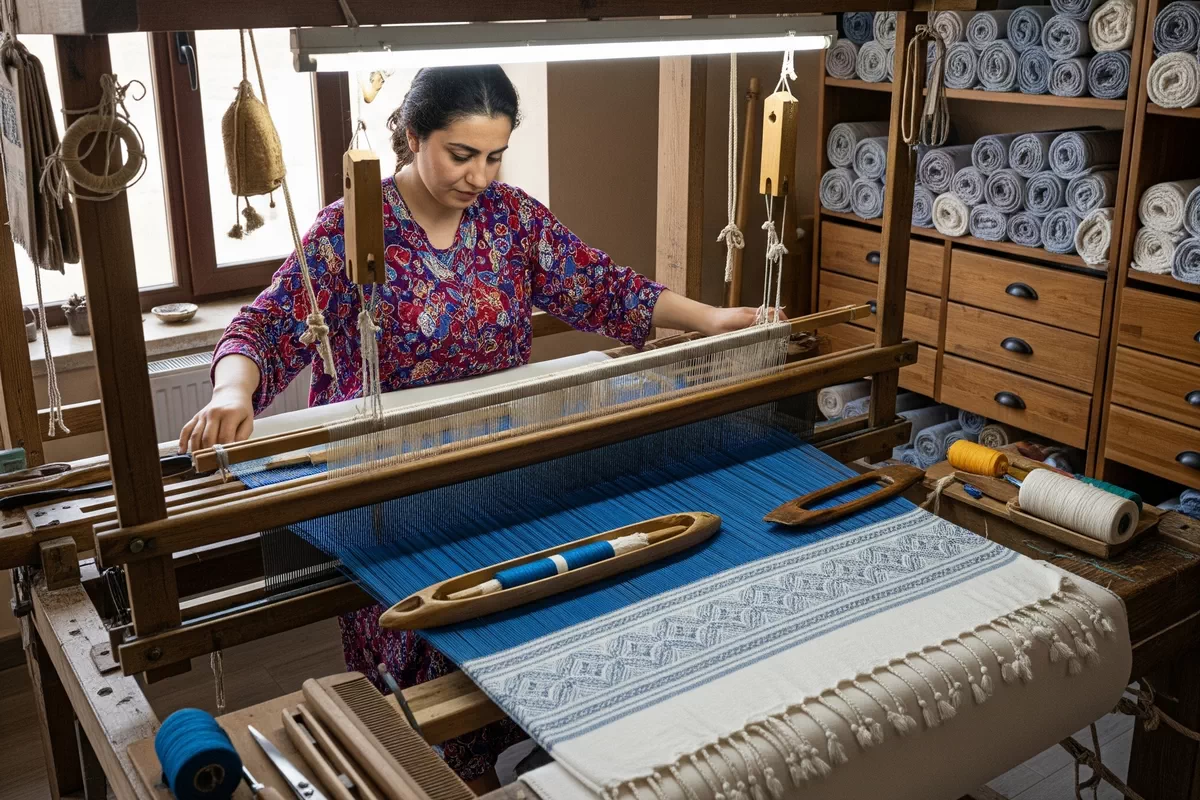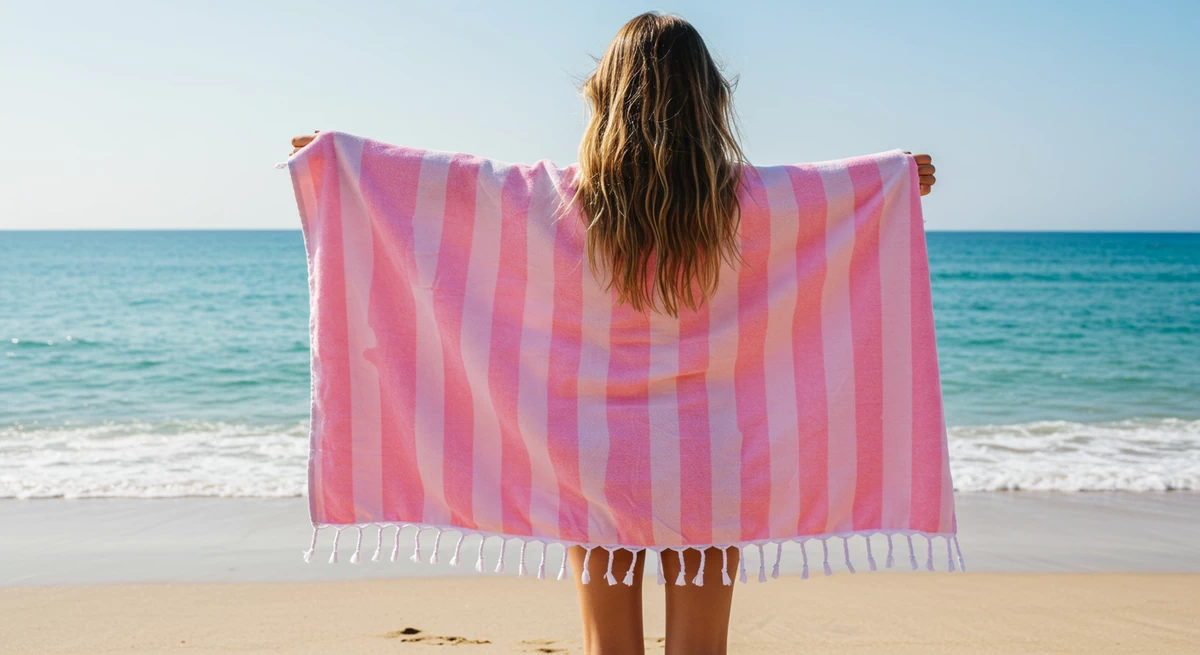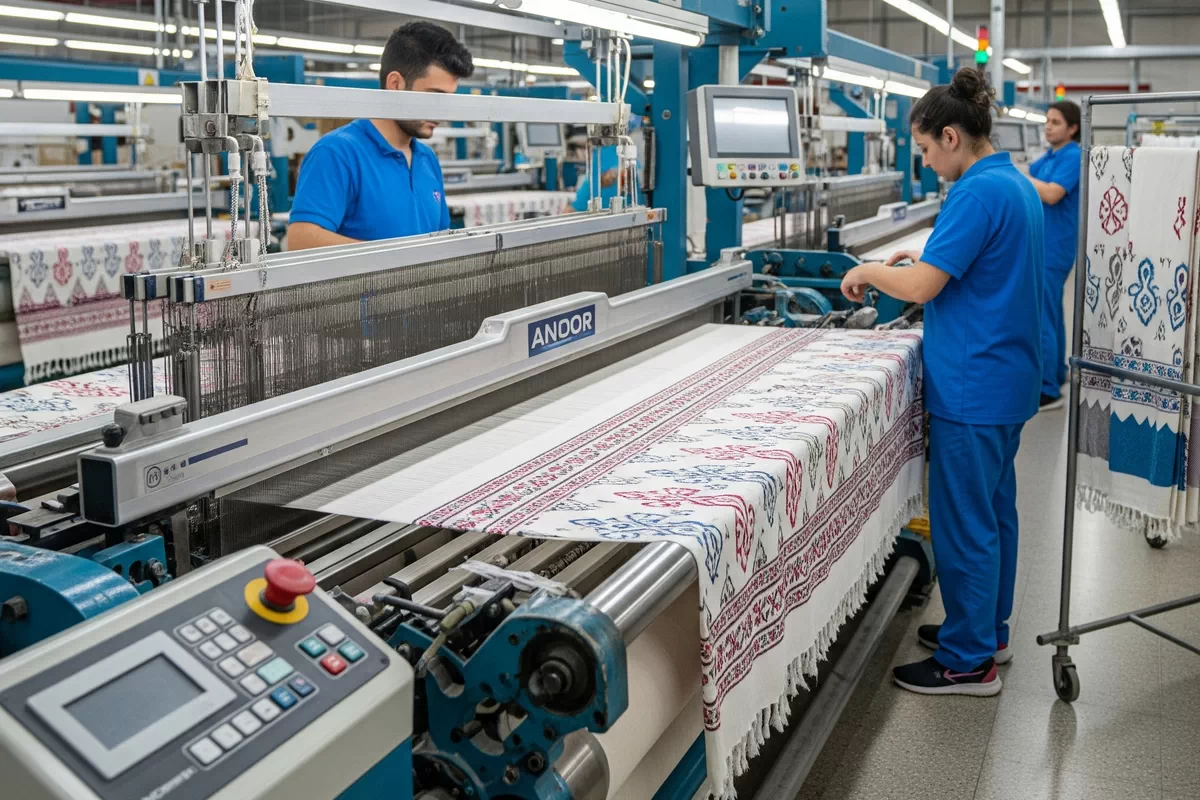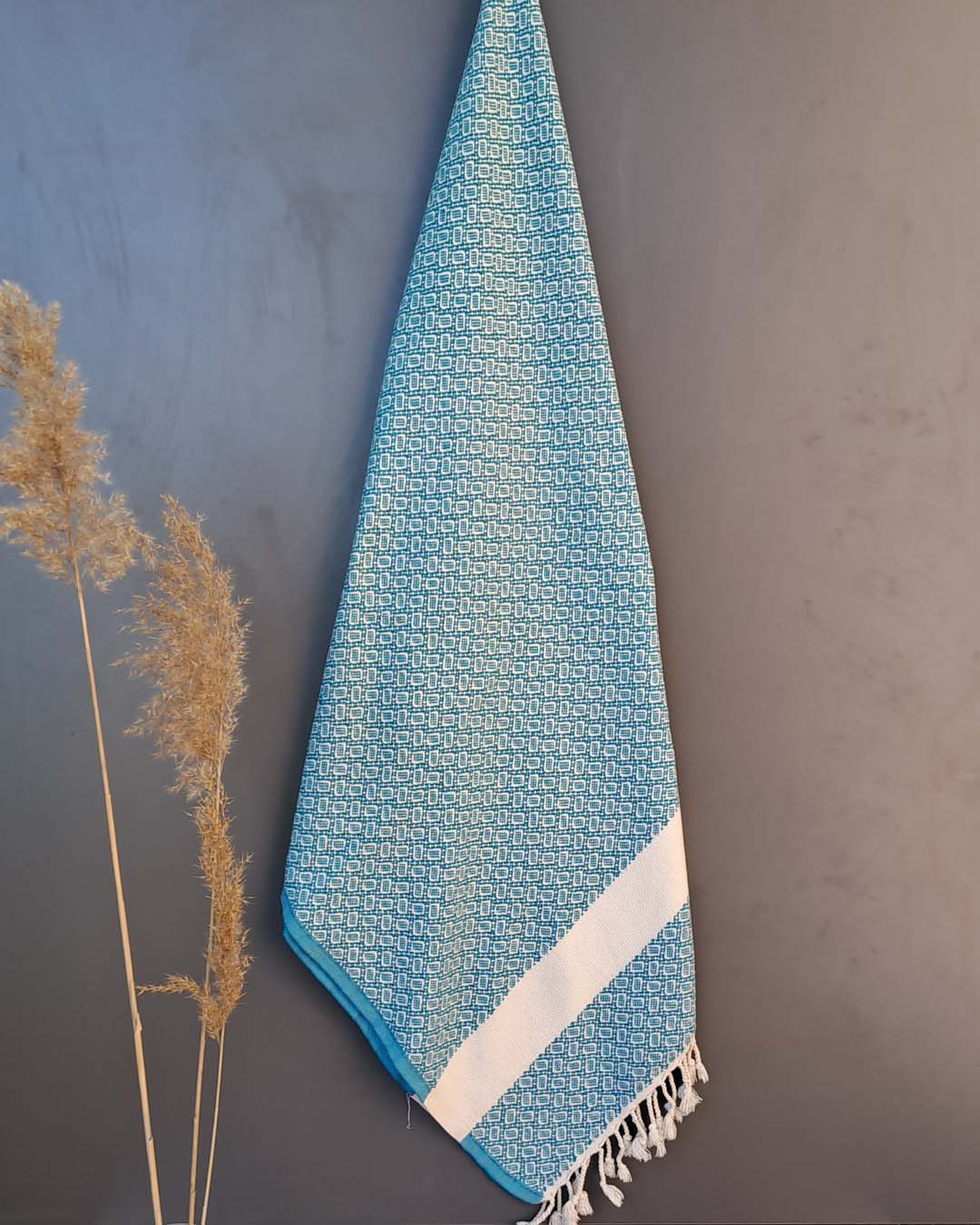Stand Out with Handwoven Peshtemals: A Product Personalization Guide for Boutique Brands
Today, starting a textile brand may seem easy; however, building a sustainable brand and ensuring long-term customer loyalty requires much more than just selling products. Consumers are no longer investing in just a towel, but in a unique, aesthetic, and personalized product with a story behind it. Therefore, the most critical factor for boutique brands that want to stand out with small but effective steps is product personalization.
This is where hand-woven peshtemals become the strongest carrier of your branding process. Thanks to its natural structure, handcrafted texture, and easily customizable form, the peshtemal is a product that creates both a functional and emotional connection. For boutique brands offering products in categories such as spa, beach, lifestyle, and home textiles, creating collections that reflect your brand identity is the most aesthetic and sustainable way to do this.
In this guide, I will walk you through the steps of creating a custom collection for your brand, the personalization options available to you, and how to establish a creative partnership with the right manufacturer.
If you’re ready, let’s start designing products that will tell your story through your customers’ hands.

This article may interest you. Peshtemal Weaving and Wholesale Prices
The Contribution of Handwoven Peshtemals to Branding
Today, branding is not limited to a logo and packaging design. Consumers connect with brands through the products they touch, feel, and experience. This is why unique, emotionally engaging, and natural products such as handwoven peshtemals offer significant opportunities, especially for boutique brands.
Every Product Is Unique, Every Stitch Carries Meaning
In hand-woven products, each piece is individually shaped by the skilled hands of master craftsmen during the production process. This transforms each peshtemal into a product that is far from mass production and has its own story.
- There are small differences in the pattern and texture of each peshtemal
- These natural differences create a “personalized” perception, especially for boutique brands
- The products are not factory-made; they are hand-woven and have their own identity.
This approach allows your customers to experience a product that is “their own” — which is the cornerstone of brand loyalty.
Textures and Craftsmanship that Enhance the Perception of Quality
Handwoven peshtemals are much softer, more durable, and have a more aesthetic feel compared to machine-made products. This is noticeable at first glance and becomes even more apparent with use.
- Skin-friendly, breathable natural structures
- Elegant fringe details, traditional finishing techniques
- A flawless texture that creates a “premium product” perception
This quality helps position your boutique brand in the high-end segment.
Customized Designs and Emotional Connection
Every brand wants to convey a unique style and message to its audience. Thanks to the customizable nature of handwoven peshtemals:
- Collections can be created to suit different styles such as bohemian, minimalist, ethnic, and modern
- The spirit of the brand is reflected in details such as color selection, pattern texture, and texture density.
- This way, your product is not only beautiful, but also becomes a piece that carries your identity.
Hand-woven products are particularly attractive to customers seeking aesthetic value and originality on Instagram, in boutique online stores, and in gift-oriented sales channels.
In summary:
Handwoven peshtemals are not just usable products; they are a means of communication that tells your brand’s story. With their naturalness, uniqueness, and artisanal spirit, they not only differentiate your brand but also deepen it.
Product Personalization Options and Techniques
One of the greatest advantages of handwoven peshtemals is their high potential for personalization. Every brand wants to offer designs that suit its target audience and style. When working with the right manufacturer, peshtemals can become more than just towels—they can become special products that reflect your brand’s values.
Color and Pattern Customizations
- Custom thread dyeing to match your brand’s corporate colors
- Modern, ethnic, traditional, or bohemian pattern options
- Custom production according to Pantone color codes
- Seasonal trend-inspired thematic collection design (e.g., summer-winter collections)
Tip: Creating collections tailored to your target audience’s preferences can significantly increase sales.
Weave Structure and Weight Options
- Lightweight, thin structures: beach & travel towels
- Thick, soft structures: spa, bath, and hammam use
- 100% cotton, bamboo, or cotton-blend options
- Different weave types such as honeycomb, plain, and herringbone for texture and appearance preferences
Each weave form can be designed according to the product’s intended use.
Logo, Label, and Brand Identity Details
- Woven logo label
- Printed paper or cardboard label
- Embroidered logo applications
- QR code story cards (linking to the product’s production story)
- Gift note or special message areas
These details help the product connect with customers not only physically but also emotionally.
Customization Based on Size and Usage Purpose
- Classic dimensions: 90×170 cm
- Baby peshtemal: 70×90 cm
- Large size for spa and hamam: 100×180 cm
- Special wide-surface cuts for the beach
Adapting the product size to the target market increases customer satisfaction and reduces return rates.
In summary:
Handwoven peshtemals offer you almost unlimited possibilities for personalization. From color to pattern, from label to packaging, every detail can reflect your brand, resulting in a product that is not just “sold” but “adopted.”

Packaging and Presentation: The Complement to Brand Perception
Let’s assume you offer a high-quality product. However, if the packaging is inadequate when the consumer first sees and picks up the product, all your efforts will be perceived as lacking. This is why, especially for boutique brands, packaging design and presentation are just as important as the product itself.
Hand-woven towels already evoke a sense of aesthetics and naturalness. Unique, elegant, and sustainable packaging solutions that reinforce this feeling increase brand value several times over.
Simplicity and Naturalness in Packaging
- Recyclable kraft paper sleeves
- Jute twine, cotton string, natural fabric ribbons
- Minimal label designs
- Short notes about the product’s production story
This type of packaging creates an environmentally friendly image and supports the natural product theme.
Labels and ID Cards
- Logo on woven or kraft label
- QR code link explaining that the product is hand-woven
- Small information cards about who wove the product (especially appealing abroad)
- Usage and washing instructions
These small but meaningful details strengthen the relationship between your brand and the product and create a “carefully prepared” perception in the consumer.
Suitability for Gift Presentation
For boutique brands, part of the purchase comes from gift shopping. Therefore:
- Single box options
- Premium packaging elements such as satin ribbons and sealed stickers
- Spaces for note cards
With details like these, you offer your customers not just a product, but an emotional experience.
Consistency and Brand Spirit in Packaging
All packaging materials should be consistent with your brand’s color palette, font, tone, and story.
- Consistency from product labels to e-commerce packaging
- Thematic collections that reflect your brand identity (e.g., “Natural Touches Collection”)
This kind of consistency makes the first impression lasting, especially in online shopping.
In short:
A quality product alone is not enough. The right packaging and presentation make your product special, add prestige to your brand, and trigger the emotional factors that influence purchasing decisions.
Is it possible to start a collection with a low MOQ?
Many boutique brand owners or entrepreneurs want to have handwoven peshtemal produced but are deterred by high minimum order quantities (MOQ). However, when working with the right manufacturer, it is definitely possible to start your branding journey with small quantities. Especially workshops with flexible production capabilities can professionally manage low-volume production.
What is MOQ and Why is it Important?
MOQ (Minimum Order Quantity) is the lowest order quantity a manufacturer will accept. Typically:
- For ready-made designs: 100–300 pieces
- For customized products (labels, logos, special sizes): 300–500 pieces
A high MOQ can pose cost and inventory risks for newcomers.
However, boutique manufacturers can be more flexible in this regard.
Starting with a Sample Process
Producing samples before placing large orders protects both the buyer and the manufacturer.
- 1–5 custom-made samples
- Weaving, weight, color, and label tests
- Pre-order revision and approval process
This minimizes risk and ensures a fair and reliable start.
Test Sales with Micro Collections
You don’t have to print thousands of products when building your brand.
- Micro collections of 100–300 pieces
- A/B tested sales with 3–5 models
- Opportunity to receive quick feedback on online platforms (Shopify, Etsy, etc.)
With this strategy, you get to know your target audience and manage your inventory correctly.
Growth with Flexible Planning
Experienced manufacturers start with low production volumes and quickly reproduce the same quality if the product is successful.
- Small production for the first order
- Transition to mass production based on success
- Adjust the supply chain to your pace
This model is ideal for entrepreneurs with limited budgets but big visions.
In conclusion:
If you want to brand yourself with handwoven peshtemals but are concerned about high quantities, there is a solution. You can start with the right manufacturer at a low MOQ, reduce risk, and grow steadily.

Strategic Partnership with the Manufacturer in the Product Development Process
One of the key factors that sets boutique brands apart is working with a strategic manufacturing partner rather than a regular supplier. This collaboration becomes even more critical for products that are open to personalization, such as handwoven peshtemals. This is because the manufacturer must not only fulfill your order but also understand your brand’s character and objectives.
Consulting During the Design Phase
A good manufacturer doesn’t just “take orders”; they contribute to the creative process:
- Recommendations on seasonal trends
- Pattern and color matching
- Model recommendations tailored to your target audience
- Product types suited to your sales channel (e.g., lightweight, shipping-friendly peshtemals for e-commerce)
This consulting service offers significant time and cost advantages, especially for brands preparing their first collection.
Prototyping and Feedback Process
- Test production is carried out at every stage, from the initial idea to the final product
- Revisions are made based on samples
- If necessary, the collection is reshaped based on customer feedback
This process allows products to be developed according to actual needs and increases customer satisfaction.
Long-Term Relationship Advantages
Strategic business partnerships are built on a sense of rhythm, harmony, and trust rather than starting from scratch with each new order.
- Previous orders are recorded
- Components such as fabrics, labels, and packaging are kept on hand
- Quick solutions when urgent production is required
- Joint planning of seasonal collections
This approach facilitates the scaling of your brand and saves time.
Communication and Feedback Culture
Communication is the foundation of cooperation.
- Open, regular, and honest communication throughout the process
- Problem-solving approach
- Working with a manufacturer who understands your language
This culture does not promote short-term trade; it ensures a sustainable relationship between the brand and the manufacturer.
In conclusion
Working with a manufacturer who understands you, offers creative solutions, and can grow with you as you build your brand can be your most valuable strategy on the road to success.
Products with a Story on the Road to Success
Consumers are no longer just looking for functional products; they want to connect with a story and share a lifestyle. This is a unique opportunity, especially for boutique brands. Because products with meaning, such as handwoven peshtemals, create an emotional connection and strengthen brand identity. Every peshtemal sold can actually be a carrier of a story.
Let Your Product Speak: Every Stitch Has Meaning
The story of a peshtemal extends from the natural fibers it’s made from to the craftsmanship of the artisan who created it.
- “This peshtemal was handwoven on a traditional loom in a workshop in Denizli that has been in the family for three generations.”
- “The threads used are made from OEKO-TEX certified cotton.”
- “The tassel details are hand-tied, each one unique.”
This type of content takes your product out of the ordinary and creates a connection with your customer.
Story-Focused Presentation on Social Media
Support your product story not just with packaging but also with content:
- Short videos showing the production process
- Close-up shots of details crafted by master weavers
- Posts conveying the message “more than just a product”
- QR codes linking to the product story (on labels)
This narrative approach fosters strong brand loyalty, especially on visual-focused platforms like Instagram, Pinterest, and Etsy.
Social Impact and Sustainability Emphasis
Your story should not only be nostalgic but also ethical and socially responsible:
- “We collaborate with women’s cooperatives.”
- “We adhere to a zero-plastic, zero-chemical principle in production.”
- “We produce with environmentally conscious packaging.”
These are not just brand image; they are powerful values that influence today’s consumers’ decision-making process.
Products with a Story, Returning Customers
A customer who connects with your product:
- Shares you with their social circle
- Becomes a loyal customer
- Accepts a higher price point
- Becomes your brand ambassador
The secret to growth for boutique brands lies precisely here.
In conclusion:
A peshtemal is not just a towel; it is a channel that carries your brand’s message. When you stand behind your product, your customer doesn’t just buy you—they defend you.
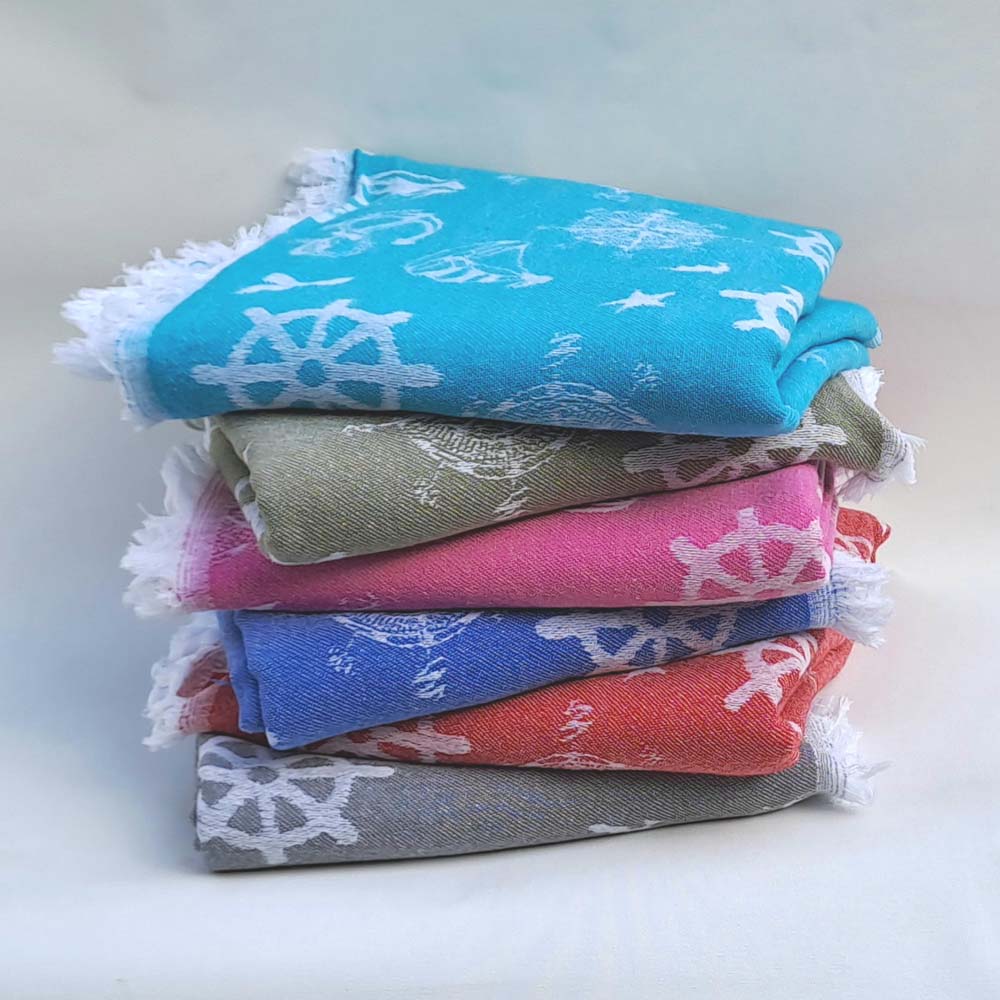
Let Your Brand Speak with Handwoven Peshtemals
If you want to grow your boutique brand, you need more than just one product that will make you heard in the market; you need a collection that is meaningful, distinctive, and supports your brand identity. Handwoven peshtemals directly address this need:
Natural, unique, aesthetic, customizable, and emotionally engaging products…
This is one of the rare categories that combines all these features.
The strategies we share in this guide are not just theoretical; they are based on real-world experience gained over years in production and hundreds of successful boutique brand examples. By working with the right manufacturer, you too can create a strong brand image on a small budget and build a loyal customer base.
Now It’s Your Turn
- Contact us today to design and produce custom-made handwoven peshtemal collections for your brand.
- Start your collection with low MOQs and no risk.
- Bring your story into your customers’ hands, hearts, and bathrooms.
👉 Your brand. Your style. Your peshtemal. Let’s weave together.

